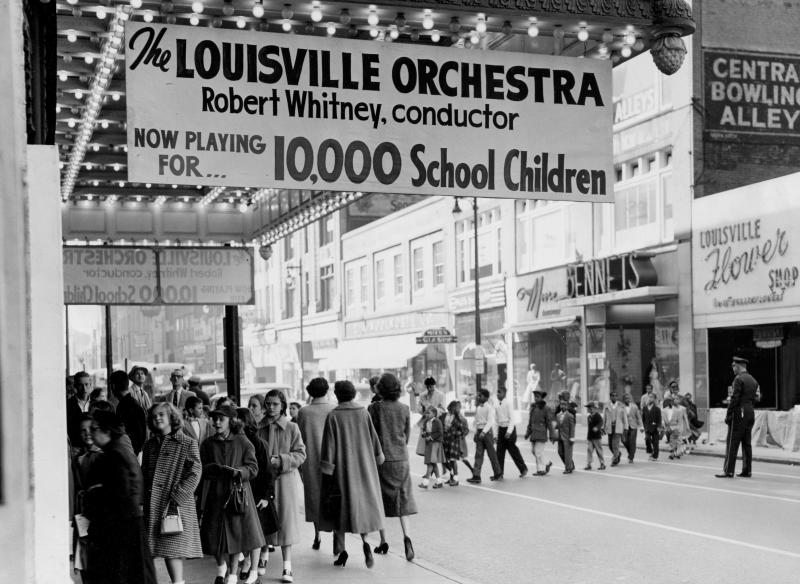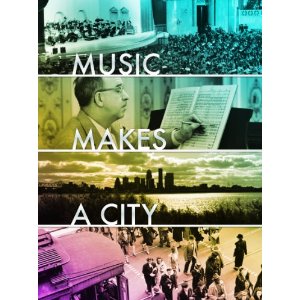Classical CDs Weekly: Dvořák, De Falla, Music Makes a City (DVD) | reviews, news & interviews
Classical CDs Weekly: Dvořák, De Falla, Music Makes a City (DVD)
Classical CDs Weekly: Dvořák, De Falla, Music Makes a City (DVD)
Spanish piano music, a popular symphony, and a resourceful American ensemble on DVD


It’s easy to become a little obsessed with obscure, underrated music. You bang on and on about works which you’re convinced are masterpieces which no one ever seems to play. Which means that it’s also easy to dismiss pieces of classical music which are genuinely popular. You think you know them so well as to never need to hear them again. Grieg’s Piano Concerto and Dvořák’s Ninth Symphony are perhaps the easiest of all to undervalue; they’re deservedly loved because they’re both pretty much both perfect. Stephen Hough’s Grieg concerto recording will be reviewed in a few weeks’ time, so here’s a pretty good recording of the Dvořák symphony hailing from, er, Bournemouth.
José Serebrier, born in Uruguay in 1938, was a youthful assistant to Leopold Stokowski back in the 1960s. His repertoire has focused on music of the last century, but he’s equally good in the mainstream. This Dvořák Nine is flexible and soulful with a lot of idiomatic rubato. Serebrier is simply following his instincts and trusting the score. And it’s a cliché to say so, but there are passages here which you feel as if you’re hearing for the first time, my favourites being the dancing woodwinds seven minutes into the Largo and the crisply articulated start of the Scherzo. Serebrier also nails perfectly the work’s close – a wistful, warm farewell, a blazing tutti melting into a soft wind chord. Sparkling readings of two Slavonic Dances top and tail the disc, but the highlight is Dvořák’s Czech Suite. It’s a delight; the Furiant of the last movement witty and pointed. The playing is excellent and the recording quality outstanding.

Not all the best Spanish music was composed by Debussy and Ravel. Here’s a bewitching disc of piano music by the Andalusian-born Manuel de Falla. Best known is Nights in the Garden of Spain; after a few seconds of those opening ponticello scratchings it’s impossible to avoid screaming out “Spain!” as if you’re answering a starter question on University Challenge. Javier Perianes’s performance was recorded with the BBCSO live at the Barbican in January; what immediately impresses is the sharpness, the steeliness of Josep Pons’s accompaniment. He, too, loves this piece but never wallows in it. The last few minutes of En los jardines de la sierra de Cordoba are overwhelming in their sultry headiness, with Perianes’s keyboard beautifully integrated into the orchestral sound.
Three of the earliest solo piano works sound noticeably un-Spanish; the influences of Chopin and Satie coming to mind; even Serenata Andaluza from 1900 makes only passing reference to Spanish folk music. Perianes opens the disc with the Cuatri piezas Españolas, each of which is a far more successful fusion of Spanish themes with French Impressionism. Le tombeau de Claude Debussy (1920) is an eloquent tribute to a composer revered by Falla; even more impressive is a stark 1936 work dedicated to the memory of Paul Dukas. Perianes spent time consulting Falla’s autograph scores before making these recordings; it’s hard to imagine them being bettered.

The Kentucky city of Louisville was devastated by a flood in 1937. As part of the city’s regeneration it was decided to form a semi-professional civic orchestra, helmed by the delightfully unflashy Robert Whitney. Over several years the Louisville Orchestra developed into a 70-piece ensemble, performing mainstream classics to a satisfied audience. The city’s mayor, Charles Farnsley, was an arts enthusiast who believed in the Confucian notion that high culture attracted wealth and power. So, from 1948, the money that would have previously paid for visiting soloists’ fees was spent on commissioning contemporary composers to write new works for Louisville. New music from the likes of Hindemith, Milhaud and Copland duly arrived, and composers’ fees were increased if they came to conduct their works in person. Louisville became an unlikely centre for contemporary music, the orchestra’s profile further raised by recording the new pieces. Audiences took some time to adjust to the unfamiliar diet, and the project was expensive – supported generously by the Rockefeller Foundation. Farnsley was vindicated – by the late 1950s, the city’s cultural profile had enhanced its reputation, leading to major companies relocating to Louisville
Owsley Brown III and Jerome Hiler’s film is a delight – an unfussy, informative documentary with a fascinating narrative. There are no dramatic reconstructions, no trendy graphics; the only vaguely contemporary note is having Louisville’s Will Oldham (better known as Bonnie Prince Billy) narrating. Talking heads include Gunther Schuller and a delightfully lucid Elliott Carter, interviewed in his 100th year, recalling the premiere of his thorny Variations for Orchestra. Surviving orchestral players look back on the Whitney era with pride, notably when they recall a visit to Carnegie Hall in 1950. It’s a timely fable about the importance of investing in the arts, soundtracked by vintage Louisville recordings. And do watch the bonus footage of Elliott Carter on the bonus DVD; I can only hope that I’ll be as articulate should I ever reach 100.
Watch the trailer to Music Makes a City
Share this article
The future of Arts Journalism
You can stop theartsdesk.com closing!
We urgently need financing to survive. Our fundraising drive has thus far raised £49,000 but we need to reach £100,000 or we will be forced to close. Please contribute here: https://gofund.me/c3f6033d
And if you can forward this information to anyone who might assist, we’d be grateful.

Subscribe to theartsdesk.com
Thank you for continuing to read our work on theartsdesk.com. For unlimited access to every article in its entirety, including our archive of more than 15,000 pieces, we're asking for £5 per month or £40 per year. We feel it's a very good deal, and hope you do too.
To take a subscription now simply click here.
And if you're looking for that extra gift for a friend or family member, why not treat them to a theartsdesk.com gift subscription?
more Classical music
 Helleur-Simcock, Hallé, Wong, Bridgewater Hall, Manchester review - moving lyricism in Elgar’s concerto
Season opener brings lyrical beauty, crisp confidence and a proper Romantic wallow
Helleur-Simcock, Hallé, Wong, Bridgewater Hall, Manchester review - moving lyricism in Elgar’s concerto
Season opener brings lyrical beauty, crisp confidence and a proper Romantic wallow
 Kohout, Spence, Braun, Manchester Camerata, Huth, RNCM, Manchester review - joy, insight, imagination and unanimity
Celebration of the past with stars of the future at the Royal Northern College
Kohout, Spence, Braun, Manchester Camerata, Huth, RNCM, Manchester review - joy, insight, imagination and unanimity
Celebration of the past with stars of the future at the Royal Northern College
 Jansen, LSO, Pappano, Barbican review - profound and bracing emotional workouts
Great soloist, conductor and orchestra take Britten and Shostakovich to the edge
Jansen, LSO, Pappano, Barbican review - profound and bracing emotional workouts
Great soloist, conductor and orchestra take Britten and Shostakovich to the edge
 Jakub Hrůša and Friends in Concert, Royal Opera review - fleshcreep in two uneven halves
Bartók kept short, and a sprawling Dvořák choral ballad done as well as it could be
Jakub Hrůša and Friends in Concert, Royal Opera review - fleshcreep in two uneven halves
Bartók kept short, and a sprawling Dvořák choral ballad done as well as it could be
 Hadelich, BBC Philharmonic, Storgårds, Bridgewater Hall, Manchester review - youth, fate and pain
Prokofiev in the hands of a fine violinist has surely never sounded better
Hadelich, BBC Philharmonic, Storgårds, Bridgewater Hall, Manchester review - youth, fate and pain
Prokofiev in the hands of a fine violinist has surely never sounded better
 Monteverdi Choir, ORR, Heras-Casado, St Martin-in-the-Fields review - flames of joy and sorrow
First-rate soloists, choir and orchestra unite in a blazing Mozart Requiem
Monteverdi Choir, ORR, Heras-Casado, St Martin-in-the-Fields review - flames of joy and sorrow
First-rate soloists, choir and orchestra unite in a blazing Mozart Requiem
 Cho, LSO, Pappano, Barbican review - finely-focused stormy weather
Chameleonic Seong-Jin Cho is a match for the fine-tuning of the LSO’s Chief Conductor
Cho, LSO, Pappano, Barbican review - finely-focused stormy weather
Chameleonic Seong-Jin Cho is a match for the fine-tuning of the LSO’s Chief Conductor
 Classical CDs: Shrouds, silhouettes and superstition
Cello concertos, choral collections and a stunning tribute to a contemporary giant
Classical CDs: Shrouds, silhouettes and superstition
Cello concertos, choral collections and a stunning tribute to a contemporary giant
 Appl, Levickis, Wigmore Hall review - fun to the fore in cabaret and show songs
A relaxed evening of light-hearted fare, with the accordion offering unusual colours
Appl, Levickis, Wigmore Hall review - fun to the fore in cabaret and show songs
A relaxed evening of light-hearted fare, with the accordion offering unusual colours
 Lammermuir Festival 2025, Part 2 review - from the soaringly sublime to the zoologically ridiculous
Bigger than ever, and the quality remains astonishingly high
Lammermuir Festival 2025, Part 2 review - from the soaringly sublime to the zoologically ridiculous
Bigger than ever, and the quality remains astonishingly high
 BBC Proms: Ehnes, Sinfonia of London, Wilson review - aspects of love
Sensuous Ravel, and bittersweet Bernstein, on an amorous evening
BBC Proms: Ehnes, Sinfonia of London, Wilson review - aspects of love
Sensuous Ravel, and bittersweet Bernstein, on an amorous evening
 Presteigne Festival 2025 review - new music is centre stage in the Welsh Marches
Music by 30 living composers, with Eleanor Alberga topping the bill
Presteigne Festival 2025 review - new music is centre stage in the Welsh Marches
Music by 30 living composers, with Eleanor Alberga topping the bill

Add comment